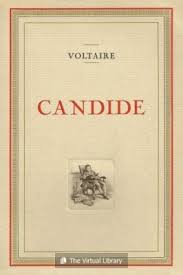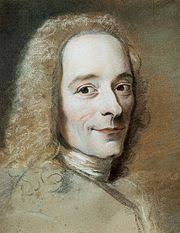Candide Page #9
Candide, ou l'Optimisme, is a French satire first published in 1759 by Voltaire, a philosopher of the Age of Enlightenment.
XIII HOW CANDIDE WAS FORCED AWAY FROM HIS FAIR CUNEGONDE AND THE OLD WOMAN. The beautiful Cunegonde having heard the old woman's history, paid her all the civilities due to a person of her rank and merit. She likewise accepted her proposal, and engaged all the passengers, one after the other, to relate their adventures; and then both she and Candide allowed that the old woman was in the right. "It is a great pity," said Candide, "that the sage Pangloss was hanged contrary to custom at an auto-da-fé; he would tell us most amazing things in regard to the physical and moral evils that overspread earth and sea, and I should be able, with due respect, to make a few objections." While each passenger was recounting his story, the ship made her way. They landed at Buenos Ayres. Cunegonde, Captain Candide, and the old woman, waited on the Governor, Don Fernando d'Ibaraa, y Figueora, y Mascarenes, y Lampourdos, y Souza. This nobleman had a stateliness becoming a person who bore so many names. He spoke to men with so noble a disdain, carried his nose so loftily, raised his voice so unmercifully, assumed so imperious an air, and stalked with such intolerable pride, that those who saluted him were strongly inclined to give him a good drubbing. Cunegonde appeared to him the most beautiful he had ever met. The first thing he did was to ask whether she was not the captain's wife. The manner in which he asked the question alarmed Candide; he durst not say she was his wife, because indeed she was not; neither durst he say she was his sister, because it was not so; and although this obliging lie had been formerly much in favour among the ancients, and although it could be useful to the moderns, his soul was too pure to betray the truth. "Miss Cunegonde," said he, "is to do me the honour to marry me, and we beseech your excellency to deign to sanction our marriage." Don Fernando d'Ibaraa, y Figueora, y Mascarenes, y Lampourdos, y Souza, turning up his moustachios, smiled mockingly, and ordered Captain Candide to go and review his company. Candide obeyed, and the Governor remained alone with Miss Cunegonde. He declared his passion, protesting he would marry her the next day in the face of the church, or otherwise, just as should be agreeable to herself. Cunegonde asked a quarter of an hour to consider of it, to consult the old woman, and to take her resolution. The old woman spoke thus to Cunegonde: "Miss, you have seventy-two quarterings, and not a farthing; it is now in your power to be wife to the greatest lord in South America, who has very beautiful moustachios. Is it for you to pique yourself upon inviolable fidelity? You have been ravished by Bulgarians; a Jew and an Inquisitor have enjoyed your favours. Misfortune gives sufficient excuse. I own, that if I were in your place, I should have no scruple in marrying the Governor and in making the fortune of Captain Candide." While the old woman spoke with all the prudence which age and experience gave, a small ship entered the port on board of which were an Alcalde and his alguazils, and this was what had happened. As the old woman had shrewdly guessed, it was a Grey Friar who stole Cunegonde's money and jewels in the town of Badajos, when she and Candide were escaping. The Friar wanted to sell some of the diamonds to a jeweller; the jeweller knew them to be the Grand Inquisitor's. The Friar before he was hanged confessed he had stolen them. He described the persons, and the route they had taken. The flight of Cunegonde and Candide was already known. They were traced to Cadiz. A vessel was immediately sent in pursuit of them. The vessel was already in the port of Buenos Ayres. The report spread that the Alcalde was going to land, and that he was in pursuit of the murderers of my lord the Grand Inquisitor. The prudent old woman saw at once what was to be done. "You cannot run away," said she to Cunegonde, "and you have nothing to fear, for it was not you that killed my lord; besides the Governor who loves you will not suffer you to be ill-treated; therefore stay." She then ran immediately to Candide. "Fly," said she, "or in an hour you will be burnt." There was not a moment to lose; but how could he part from Cunegonde, and where could he flee for shelter? XIV HOW CANDIDE AND CACAMBO WERE RECEIVED BY THE JESUITS OF PARAGUAY. Candide had brought such a valet with him from Cadiz, as one often meets with on the coasts of Spain and in the American colonies. He was a quarter Spaniard, born of a mongrel in Tucuman; he had been singing-boy, sacristan, sailor, monk, pedlar, soldier, and lackey. His name was Cacambo, and he loved his master, because his master was a very good man. He quickly saddled the two Andalusian horses. "Come, master, let us follow the old woman's advice; let us start, and run without looking behind us." Candide shed tears. "Oh! my dear Cunegonde! must I leave you just at a time when the Governor was going to sanction our nuptials? Cunegonde, brought to such a distance what will become of you?" "She will do as well as she can," said Cacambo; "the women are never at a loss, God provides for them, let us run." "Whither art thou carrying me? Where shall we go? What shall we do without Cunegonde?" said Candide. "By St. James of Compostella," said Cacambo, "you were going to fight against the Jesuits; let us go to fight for them; I know the road well, I'll conduct you to their kingdom, where they will be charmed to have a captain that understands the Bulgarian exercise. You'll make a prodigious fortune; if we cannot find our account in one world we shall in another. It is a great pleasure to see and do new things." "You have before been in Paraguay, then?" said Candide. "Ay, sure," answered Cacambo, "I was servant in the College of the Assumption, and am acquainted with the government of the good Fathers as well as I am with the streets of Cadiz. It is an admirable government. The kingdom is upwards of three hundred leagues in diameter, and divided into thirty provinces; there the Fathers possess all, and the people nothing; it is a masterpiece of reason and justice. For my part I see nothing so divine as the Fathers who here make war upon the kings of Spain and Portugal, and in Europe confess those kings; who here kill Spaniards, and in Madrid send them to heaven; this delights me, let us push forward. You are going to be the happiest of mortals. What pleasure will it be to those Fathers to hear that a captain who knows the Bulgarian exercise has come to them!" As soon as they reached the first barrier, Cacambo told the advanced guard that a captain wanted to speak with my lord the Commandant. Notice was given to the main guard, and immediately a Paraguayan officer ran and laid himself at the feet of the Commandant, to impart this news to him. Candide and Cacambo were disarmed, and their two Andalusian horses seized. The strangers were introduced between two files of musketeers; the Commandant was at the further end, with the three-cornered cap on his head, his gown tucked up, a sword by his side, and a spontoon[15] in his hand. He beckoned, and straightway the new-comers were encompassed by four-and-twenty soldiers. A sergeant told them they must wait, that the Commandant could not speak to them, and that the reverend Father Provincial does not suffer any Spaniard to open his mouth but in his presence, or to stay above three hours in the province.
Translation
Translate and read this book in other languages:
Select another language:
- - Select -
- 简体中文 (Chinese - Simplified)
- 繁體中文 (Chinese - Traditional)
- Español (Spanish)
- Esperanto (Esperanto)
- 日本語 (Japanese)
- Português (Portuguese)
- Deutsch (German)
- العربية (Arabic)
- Français (French)
- Русский (Russian)
- ಕನ್ನಡ (Kannada)
- 한국어 (Korean)
- עברית (Hebrew)
- Gaeilge (Irish)
- Українська (Ukrainian)
- اردو (Urdu)
- Magyar (Hungarian)
- मानक हिन्दी (Hindi)
- Indonesia (Indonesian)
- Italiano (Italian)
- தமிழ் (Tamil)
- Türkçe (Turkish)
- తెలుగు (Telugu)
- ภาษาไทย (Thai)
- Tiếng Việt (Vietnamese)
- Čeština (Czech)
- Polski (Polish)
- Bahasa Indonesia (Indonesian)
- Românește (Romanian)
- Nederlands (Dutch)
- Ελληνικά (Greek)
- Latinum (Latin)
- Svenska (Swedish)
- Dansk (Danish)
- Suomi (Finnish)
- فارسی (Persian)
- ייִדיש (Yiddish)
- հայերեն (Armenian)
- Norsk (Norwegian)
- English (English)
Citation
Use the citation below to add this book to your bibliography:
Style:MLAChicagoAPA
"Candide Books." Literature.com. STANDS4 LLC, 2025. Web. 22 Jan. 2025. <https://www.literature.com/book/candide_25>.




Discuss this Candide book with the community:
Report Comment
We're doing our best to make sure our content is useful, accurate and safe.
If by any chance you spot an inappropriate comment while navigating through our website please use this form to let us know, and we'll take care of it shortly.
Attachment
You need to be logged in to favorite.
Log In